地道英文俚语A-Z281-290
- 格式:docx
- 大小:58.02 KB
- 文档页数:12
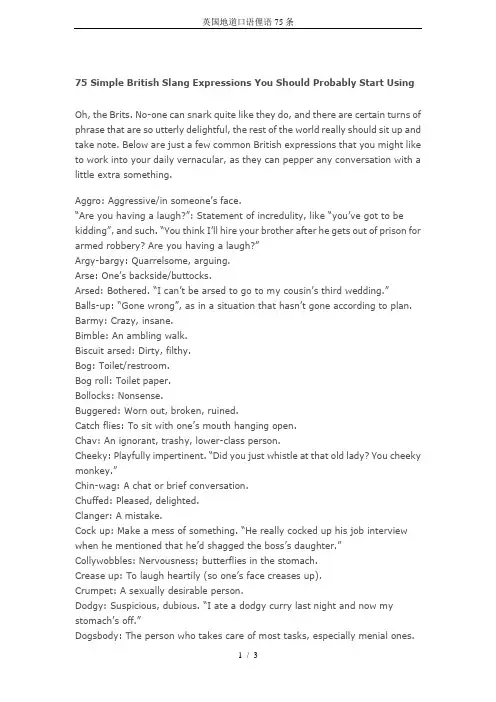
75 Simple British Slang Expressions You Should Probably Start UsingOh, the Brits. No-one can snark quite like they do, and there are certain turns of phrase that are so utterly delightful, the rest of the world really should sit up and take note. Below are just a few common British expressions that you might like to work into your daily vernacular, as they can pepper any conversation with a little extra something.Aggro: Aggressive/in someone’s face.“Are you having a laugh?”: Statement of incredulity, like “you’ve got to be kidding”, and such. “You think I’ll hire your brother after he gets out of prison for armed robbery? Are you having a laugh?”Argy-bargy: Quarrelsome, arguing.Arse: One’s backside/buttocks.Arsed: Bothered. “I can’t be arsed to go to my cousin’s third wedding.”Balls-up: “Gone wrong”, as in a situation that hasn’t gone according to plan. Barmy: Crazy, insane.Bimble: An ambling walk.Biscuit arsed: Dirty, filthy.Bog: Toilet/restroom.Bog roll: Toilet paper.Bollocks: Nonsense.Buggered: Worn out, broken, ruined.Catch flies: To sit with one’s mouth hanging open.Chav: An ignorant, trashy, lower-class person.Cheeky: Playfully impertinent. “Did you just whistle at that old lady? You cheeky monkey.”Chin-wag: A chat or brief conversation.Chuffed: Pleased, delighted.Clanger: A mistake.Cock up: Make a mess of something. “He really cocked up his job interview when he mentioned that he’d shagged the boss’s daughter.”Collywobbles: Nervousness; butterflies in the stomach.Crease up: To laugh heartily (so one’s face creases up).Crumpet: A sexually desirable person.Dodgy: Suspicious, dubious. “I ate a dodgy curry last night and now my stomach’s off.”Dogsbody: The person who takes care of most tasks, especially menial ones.Drop a clanger: To make an obvious mistake or terrible faux-pas.Dull as dishwater: Exceedingly, horribly boring or plain.Ear-bashing: A severe reprimand. “He got a right ear-bashing after crashing his dad’s car into that buffalo.”Fall arse over tit: Take a tumble/head over heels.Gammy: Injured, lame, or painful. “My gran’s had a gammy leg ever since she fell off a horse.”“Get stuffed!”: An angry rebuke, similar to “Go f*ck yourself!”Giddy kipper: An overly excitable person.Ginger: A red-haired person.Gobby: Offensively outspoken.Gobsmacked: Stunned/utterly blown away.Grotty: Unpleasant/disgusting.Gutted: Devastated. “She was gutted after her boyfriend left her for her nephew.”Knackered: Exhausted.Legless: So drunk, one has difficulty standing.Liquid lunch: A meal that consists mostly of alcohol, rather than food.Lost the plot: Lost one’s mind/gone senile. “My great-uncle thinks he’s an admiral with the United Federation of Planets, but of course, he lost the plot years ago.”Lurgy: The flu, or other illness that makes you feel horrible.“Mad as a bag of ferrets”: Utterly and completely insane.Manky: Disgusting. “The chicken you left on the counter for a week has gone manky.”Miffed: Irked.Moggy: Cat.Muck up: Ruin something.Murder: Devour. “I could murder a sandwich right now.”Naff: Unfashionable.Nethers: Euphemism for genitals.Pants: Rubbish. “She said the film was pants, but I rather liked it.”Peckish: Slightly hungry.Peevish: Petulant and sullen.Plonk: Horrible, cheap wine.Prat: An idiot.Rubbish: Ter rible, crap. “I’m totally rubbish at math—can’t even add.”Sad arse: Pathetic person.Sausage fest: An event that has a disproportionate amount of males to females… like a comic convention.Shag: Have sex.Shattered: Worn out, exhausted.Shufflebutt: A restless, fidgety person.Slag: A contemptible person; possibly a promiscuous one.Smarmy: Creepy, sleazy.Smashing: Brilliant, wonderful.Snog: To make out/fool around.Snookered: Defeated/thwarted.“Sod it.”: “I give up.” Used in a sentence: “I’ll never und erstand this math problem. Sod it, let’s go down to the pub.”Sprog: A child/offspring.Starkers: Naked.Taking the piss: Making fun of something.Tosh: Rubbish/nonsense.Tosser: A contemptible idiot.Twee: Overly dainty, delicate, cute, or quaint. “Her bu nny-themed tea set is so utterly twee.”Wazzock: Imbecile.Wonky: Unstable. “The table leg’s a bit wonky; you might want to slide a book under it.”。
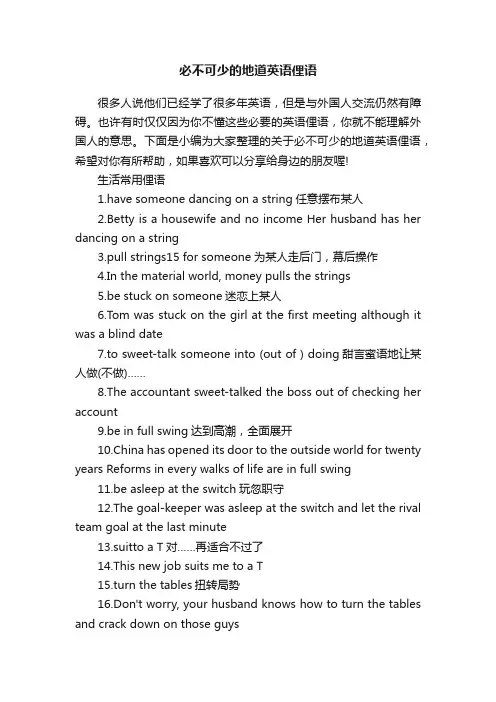
必不可少的地道英语俚语很多人说他们已经学了很多年英语,但是与外国人交流仍然有障碍。
也许有时仅仅因为你不懂这些必要的英语俚语,你就不能理解外国人的意思。
下面是小编为大家整理的关于必不可少的地道英语俚语,希望对你有所帮助,如果喜欢可以分享给身边的朋友喔!生活常用俚语1.have someone dancing on a string任意摆布某人2.Betty is a housewife and no income Her husband has her dancing on a string3.pull strings15 for someone为某人走后门,幕后操作4.In the material world, money pulls the strings5.be stuck on someone迷恋上某人6.Tom was stuck on the girl at the first meeting although it was a blind date7.to sweet-talk someone into (out of ) doing甜言蜜语地让某人做(不做)……8.The accountant sweet-talked the boss out of checking her account9.be in full swing达到高潮,全面展开10.China has opened its door to the outside world for twenty years Reforms in every walks of life are in full swing11.be asleep at the switch玩忽职守12.The goal-keeper was asleep at the switch and let the rival team goal at the last minute13.suitto a T对……再适合不过了14.This new job suits me to a T15.turn the tables扭转局势16.Don't worry, your husband knows how to turn the tables and crack down on those guys17.drink someone under the table把某人灌醉18.He has a hollow leg He can drink all of us here under the table19.keep tabs on something/someone掌握情况,密切关注20.He has subscribed16 ten newspapers in order to keep tabs on the new developments in market management21.keep someone down a notch17挫某人的傲气22.The monitor likes to order us around He needs to be kept down a notch23.have one's heart set on一心想要……24.Once he had his heart set on something, he'll accept no turning-back25.one's heart in one's mouth吓得要命26.My heart was in my mouth when I heart someone tapping on my window one raining night27.have one's heart in one's mouth; with one's heart in one's mouth28.not have the heart to do something不忍心去做29.How can you have the heart to kill my pet?30.take something to heart往心里去/认真接受意见等31.Tom decided18 to take his father's words to heart and wash his hands off smoking32.be in the seventh heaven高心极了33.Mary was in seventh heaven when she finally came to Paris, the center of fashion34.move heaven and earth想尽一切办法35.Believe me I promise to move heaven and earth to help you36.cool one's heels等的双脚发凉,久等37.Let's meet at the gallery at 7 o'clock Come at 7 sharp Don'tmake me cool my heels38.take to one's heels逃走39.The naughty boy took to his heels after he should 'trick-or-treat'40.win one's spurs受到奖赏交流必备的俚语1.My boss is my uncle In order to avoid unnecessary misunderstanding, I'd better keep him at arm's length in company2.let someone down使某人失望3.Joe really let me down by having broken his promises for several times4.can't for the life of one怎么……也不行5.I thought I could recite my speech backwards9, but when I stood in front of the audience, I couldn't for the life of me remember what to say6.air one's linen10 in public家丑外扬7.The wife was often beaten by her husband, but she never told others She didn't want to air her linen in public8.shoot from the hip11信口开河9.Don't take Jay's words to heart He shouldn't have shot from the hip10.by hook or by crook12千方百计得,不择手段得11.He rose to that position by hook or by crook12.blow hot and cold出尔反尔,喜怒无常13.Do you think he'll support you? He is the type who blows hot and cold14.make it hot for刁难某人15.Out section manager is a woman Our general manager always looks down upon her and makes everything hot for her16.have the lots for someone迷恋某人17.You have to stop her She has the lots for a married man18.bring down the house博得满堂喝彩19.The first-prize winner of the speech contest has brought down the house for several times20.be over the hump已度过难关21.The Asian financial crises has almost paralyzed Asian economy But we are over the hump now22.have a hunch13 that预感到……23.I have a hunch that the bear market will be over soon24.be hunky-dory挺不错的25.A: How do you like the food here? B: Hunky-dory26.skate on thin ice如履薄冰,冒风险27.We are skating on thin ice if we continue killing14 wild animals28.toy with the idea of心里盘算要……29.She's toying within the idea of marring a foreigner30.no ifs, ands and buts不要找任何的理由和借口31.A: You know I could have done it well, but B: No ifs, ands and buts Tell me if you want to save your job32.give someone an inch and he'll take a mile得寸进尺33.Give my roommate an inch and he'll take a mile Last time,I offered him some candies Today, he asked for an ice-cream34.have many irons in the fire同时有很多要紧的事要做35.Although he was out of job, he still wrote to his parents saying he had many irons in the fire36.be in a jam陷入困境37.get in a jam38.You've got to help me I'm in a jam May car refused to work on my way to office39.jaywalk横穿马路40.It is dangerous to jaywalk。
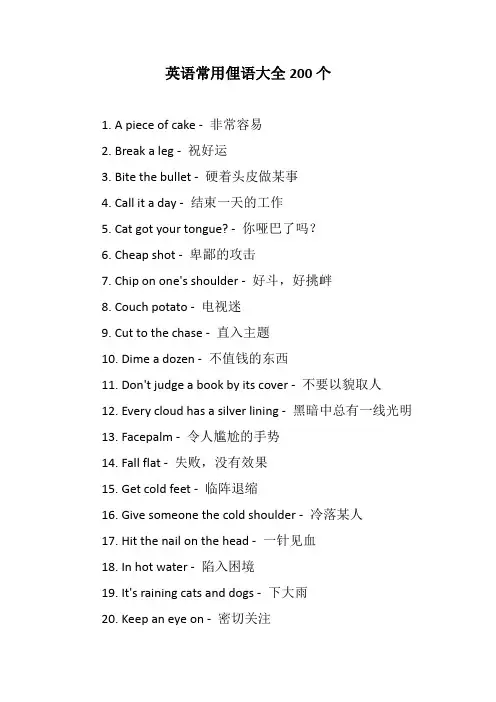
英语常用俚语大全200个1. A piece of cake -非常容易2. Break a leg -祝好运3. Bite the bullet -硬着头皮做某事4. Call it a day -结束一天的工作5. Cat got your tongue? -你哑巴了吗?6. Cheap shot -卑鄙的攻击7. Chip on one's shoulder -好斗,好挑衅8. Couch potato -电视迷9. Cut to the chase -直入主题10. Dime a dozen -不值钱的东西11. Don't judge a book by its cover -不要以貌取人12. Every cloud has a silver lining -黑暗中总有一线光明13. Facepalm -令人尴尬的手势14. Fall flat -失败,没有效果15. Get cold feet -临阵退缩16. Give someone the cold shoulder -冷落某人17. Hit the nail on the head -一针见血18. In hot water -陷入困境19. It's raining cats and dogs -下大雨20. Keep an eye on -密切关注21. Last but not least -最后但并非最不重要的22. Let the cat out of the bag -泄露秘密23. Lost in translation -无法理解24. Make a long story short -长话短说25. No pain, no gain -不劳无获26. On cloud nine -非常高兴27. Out of the blue -突然,出乎意料28. Pull someone's leg -开玩笑,愚弄某人29. Put all your eggs in one basket -孤注一掷30. See eye to eye -意见一致31. Take a rain check -改天再约32. The ball is in your court -轮到你出招了33. Under the weather -不舒服,生病34. When pigs fly -不可能的事情35. Whistle while you work -边工作边吹口哨36. You are what you eat -人如其食37. Bite off more than you can chew -贪多嚼不烂38. Burn the midnight oil -熬夜学习或工作39. Call it quits -停止,放弃40. Cost an arm and a leg -非常昂贵41. Drop the ball -失职,疏忽42. Go bananas -发疯,失去理智43. Hit the sack -去睡觉44. In a pickle -陷入困境45. Kill two birds with one stone -一石二鸟46. Lay low -保持低调,避免引起注意47. Let sleeping dogs lie -勿揭人疮疤,勿惹麻烦48. Mind your own business -管好自己的事情49. Once in a blue moon -千载难逢,很少发生50. Play it by ear -随机应变,看情况行事51. Pull yourself together -振作起来,恢复精神52. Put up or shut up -要么行动,要么闭嘴53. Seen better days -过去的好日子,现在不如以前54. Stick to your guns -坚持自己的立场和观点55. Take the bull by the horns -勇敢面对困难,迎难而上56. Talk back to someone who deserves it -反驳应得的人57. The early bird catches the worm -早起的鸟儿有虫吃58. Time flies when you're having fun -快乐时光过得飞快59. To be up in arms about something -对某事非常生气或不满60. What's the catch? -还有别的条件吗?有什么陷阱?61. When pigs fly! -这是绝对不可能的!62. A blessing in disguise -塞翁失马,焉知非福63. Barking up the wrong tree -找错了目标,误解了事实64. Beat around the bush -拐弯抹角,旁敲侧击65. Better late than never -迟做总比不做好66. Break a leg! -祝你好运!(演员常说的祝福语)67. Butter someone up -讨好某人,拍马屁68. By the skin of one's teeth -勉强成功,险些失败69. Call it a day job! -这是一份日结的工作!(讽刺工作无聊、低薪)70. Cold turkey -突然戒掉某种习惯或瘾症71. Cut corners -偷工减料,走捷径72. Dead ringer for someone/something -与某人/某物极为相似73. Don't count your chickens before they hatch! -别高兴得太早!(事情还没成定局)74. Every cloud has a silver lining! -每朵乌云都有银边!(坏事中总有好事)75. Get cold feet! -我害怕了!(临阵退缩)76. Hit the hay! -该睡觉了!77. In hot water! -陷入困境!78. Keep an eye on the ball! -注意看球!79. Last but not least, good luck! -最后但同样重要的是,祝你好运!80. Let the cat out of the bag! -泄露秘密!81. Lost in translation! -无法理解!82. Make a long story short, I'm sorry! -长话短说,我很抱歉!83. No pain, no gain! -不劳无获!84. On cloud nine! -非常高兴!85. Out of the blue! -突然发生!86. Pull someone's leg! -开玩笑!87. Put all your eggs in one basket! -孤注一掷!88. See eye to eye! -意见一致!89. Take a rain check! -改天再约!90. The ball is in your court! -轮到你了!91. Under the weather! -不舒服!92. When pigs fly! -不可能的事情!93. Whistle while you work! -边工作边吹口哨!94. You are what you eat! -你就是你吃的东西!95. Bite off more than you can chew! -贪多嚼不烂!96. Burn the midnight oil! -熬夜学习或工作!97. Call it quits! -停止,放弃!98. Cost an arm and a leg! -非常昂贵!99. Drop the ball! -失职,疏忽!100. Go bananas! -发疯,失去理智!101. Hit the sack! -去睡觉!102. In a pickle! -陷入困境!103. Kill two birds with one stone! -一石二鸟!104. Lay low! -保持低调,避免引起注意!105. Let sleeping dogs lie! -勿揭人疮疤,勿惹麻烦!106. Mind your own business! -管好自己的事情!107. Once in a blue moon! -千载难逢,很少发生!108. Play it by ear! -随机应变,看情况行事!109. Pull yourself together! -振作起来,恢复精神!110. Put up or shut up! -要么行动,要么闭嘴!111. Seen better days! -过去的好日子,现在不如以前!112. Stick to your guns! -坚持自己的立场和观点!113. Take the bull by the horns! -勇敢面对困难,迎难而上!114. Talk back to someone who deserves it! -反驳应得的人!115. The early bird catches the worm! -早起的鸟儿有虫吃!116. To be up in arms about something! -对某事非常生气或不满!117. What's the catch? -还有别的条件吗?有什么陷阱?118. When pigs fly! -这是绝对不可能的!119. A blessing in disguise! -塞翁失马,焉知非福!120. Barking up the wrong tree! -找错了目标,误解了事实!121. Beat around the bush! -拐弯抹角,旁敲侧击!122. Better late than never! -迟做总比不做好!123. Break a leg! -祝你好运!(演员常说的祝福语)124. Butter someone up! -讨好某人,拍马屁!125. By the skin of one's teeth! -勉强成功,险些失败!126. Call it a day job! -这是一份日结的工作!(讽刺工作无聊、低薪)127. Cold turkey! -突然戒掉某种习惯或瘾症!128. Cut corners! -偷工减料,走捷径!129. Dead ringer for someone/something! -与某人/某物极为相似!130. Don't count your chickens before they hatch! -别高兴得太早!(事情还没成定局)131. Every cloud has a silver lining! -每朵乌云都有银边!(坏事中总有好事)132. Get cold feet! -我害怕了!(临阵退缩)133. Keep an eye on the ball! -注意看球!134. Last but not least, good luck! -最后但同样重要的是,祝你好运!135. Let the cat out of the bag! -泄露秘密!136. Lost in translation! -无法理解!137. Make a long story short, I'm sorry! -长话短说,我很抱歉!138. No pain, no gain! -不劳无获!139. On cloud nine! -非常高兴!140. Out of the blue! -突然发生!141. Pull someone's leg! -开玩笑!142. Put all your eggs in one basket! -孤注一掷!143. See eye to eye! -意见一致!144. Take a rain check! -改天再约!145. The ball is in your court! -轮到你了!146. Under the weather! -不舒服!147. When pigs fly! -不可能的事情!148. Whistle while you work! -边工作边吹口哨!149. You are what you eat! -你就是你吃的东西!150. Bite off more than you can chew! -贪多嚼不烂!151. Burn the midnight oil! -熬夜学习或工作!152. Call it quits! -停止,放弃!153. Cost an arm and a leg! -非常昂贵!154. Drop the ball! -失职,疏忽!155. Go bananas! -发疯,失去理智!156. Hit the sack! -去睡觉!157. In a pickle! -陷入困境!158. Kill two birds with one stone! -一石二鸟!159. Lay low! -保持低调,避免引起注意!160. Let sleeping dogs lie! -勿揭人疮疤,勿惹麻烦!161. Mind your own business! -管好自己的事情!162. Once in a blue moon! -千载难逢,很少发生!163. Play it by ear! -随机应变,看情况行事!164. Pull yourself together! -振作起来,恢复精神!165. Put up or shut up! -要么行动,要么闭嘴!166. Seen better days! -过去的好日子,现在不如以前!167. Stick to your guns! -坚持自己的立场和观点!168. Take the bull by the horns! -勇敢面对困难,迎难而上!169. Talk back to someone who deserves it! -反驳应得的人!170. The early bird catches the worm! -早起的鸟儿有虫吃!171. To be up in arms about something! -对某事非常生气或不满!172. What's the catch? -还有别的条件吗?有什么陷阱?173. When pigs fly! -这是绝对不可能的!174. A blessing in disguise! -塞翁失马,焉知非福!175. Barking up the wrong tree! -找错了目标,误解了事实!176. Beat around the bush! -拐弯抹角,旁敲侧击!177. Better late than never! -迟做总比不做好!178. Break a leg! -祝你好运!(演员常说的祝福语)179. Butter someone up! -讨好某人,拍马屁!180. By the skin of one's teeth! -勉强成功,险些失败!181. Call it a day job! -这是一份日结的工作!(讽刺工作无聊、低薪)182. Cold turkey! -突然戒掉某种习惯或瘾症!183. Cut corners! -偷工减料,走捷径!184. Dead ringer for someone/something! -与某人/某物极为相似!185. Don't count your chickens before they hatch! -别高兴得太早!(事情还没成定局)186. Every cloud has a silver lining! -每朵乌云都有银边!(坏事中总有好事)187. Get cold feet! -我害怕了!(临阵退缩)188. Keep an eye on the ball! -注意看球!189. Last but not least, good luck! -最后但同样重要的是,祝你好运!190. Let the cat out of the bag! -泄露秘密!191. Lost in translation! -无法理解!192. Make a long story short, I'm sorry! -长话短说,我很抱歉!193. No pain, no gain! -不劳无获!194. On cloud nine! -非常高兴!195. Out of the blue! -突然发生!196. Pull someone's leg! -开玩笑!197. Put all your eggs in one basket! -孤注一掷!198. See eye to eye! -意见一致!199. Take a rain check! -改天再约!200. The ball is in your court! -轮到你了!。
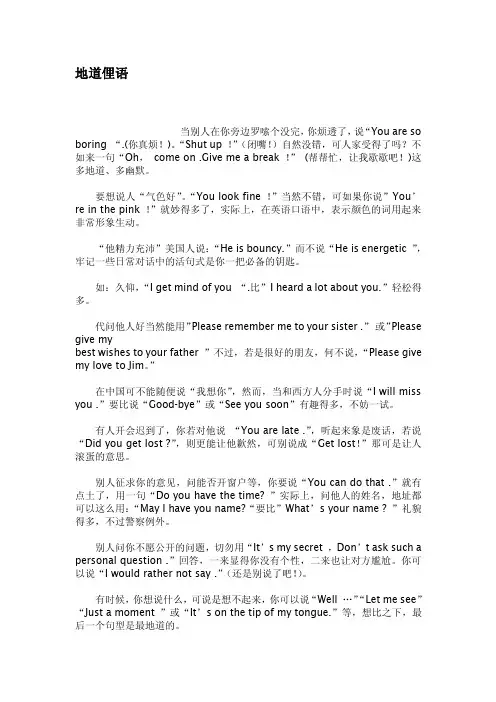
地道俚语当别人在你旁边罗嗦个没完,你烦透了,说“You are so boring“.(你真烦!)。
“Shut up!”(闭嘴!)自然没错,可人家受得了吗?不如来一句“Oh,come on.Give me a break!”(帮帮忙,让我歇歇吧!)这多地道、多幽默。
要想说人“气色好”。
“You look fine!”当然不错,可如果你说”You’re in the pink!”就妙得多了,实际上,在英语口语中,表示颜色的词用起来非常形象生动。
“他精力充沛”美国人说:“He is bouncy.”而不说“He is energetic”,牢记一些日常对话中的活句式是你一把必备的钥匙。
如:久仰,“I get mind of you“.比”I heard a lot about you.”轻松得多。
代问他人好当然能用”Please remember me to your sister.”或”Please give mybest wishes to your father”不过,若是很好的朋友,何不说,“Please give my love to Jim。
”在中国可不能随便说“我想你”,然而,当和西方人分手时说“I will miss you.”要比说“Good-bye”或“See you soon”有趣得多,不妨一试。
有人开会迟到了,你若对他说“You are late.”,听起来象是废话,若说“Did you get lost?”,则更能让他歉然,可别说成“Get lost!”那可是让人滚蛋的意思。
别人征求你的意见,问能否开窗户等,你要说“You can do that.”就有点土了,用一句“Do you have the time?”实际上,问他人的姓名,地址都可以这么用:“May I have you name?“要比”What’s your name?”礼貌得多,不过警察例外。
别人问你不愿公开的问题,切勿用“It’s my secret,Don’t ask such a personal question.”回答,一来显得你没有个性,二来也让对方尴尬。
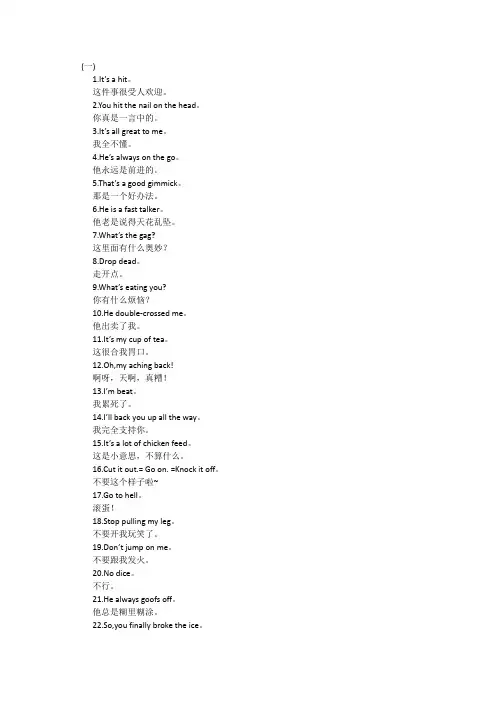
(一)1.It’s a hit。
这件事很受人欢迎。
2.You hit the nail on the head。
你真是一言中的。
3.It’s all great to me。
我全不懂。
4.He’s always on the go。
他永远是前进的。
5.That’s a good gimmick。
那是一个好办法。
6.He is a fast talker。
他老是说得天花乱坠。
7.What’s the gag?这里面有什么奥妙?8.Drop dead。
走开点。
9.What’s eating you?你有什么烦恼?10.He double-crossed me。
他出卖了我。
11.It’s my cup of tea。
这很合我胃口。
12.Oh,my aching back!啊呀,天啊,真糟!13.I’m beat。
我累死了。
14.I’ll back you up all the way。
我完全支持你。
15.It’s a lot of chicken feed。
这是小意思,不算什么。
16.Cut it out.= Go on. =Knock it off。
不要这个样子啦~17.Go to hell。
滚蛋!18.Stop pulling my leg。
不要开我玩笑了。
19.Don’t jump on me。
不要跟我发火。
20.No dice。
不行。
21.He always goofs off。
他总是糊里糊涂。
22.So,you finally broke the ice。
你终于打破了僵局。
23.Nuts!胡说!24.He is a nut。
他有点神经病。
25.It’s on the house。
这是免费的。
26.Don’t panic。
不要慌啊!27.He is a phoney。
他是一个骗子。
28.He was put on the spot。
他已经给人打死了。
29.He’s down and out。
他已经完了。
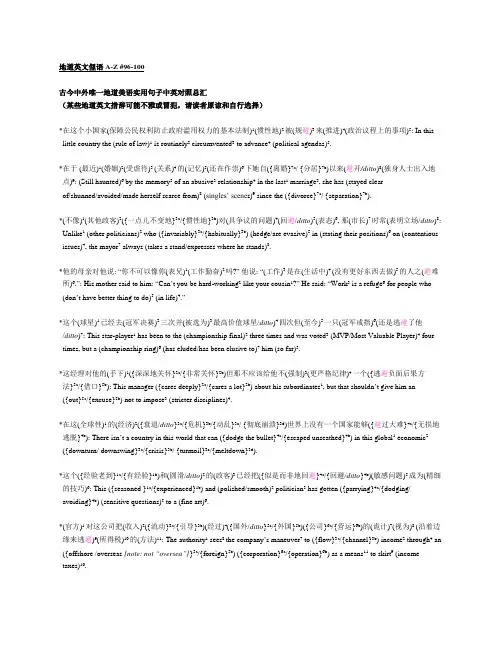
地道英文俚语A-Z #96-100古今中外唯一地道美语实用句子中英对照总汇(某些地道英文措辞可能不雅或冒犯,请读者原谅和自行选择)*在这个小国家(保障公民权利防止政府滥用权力的基本法制)1(惯性地)2被(规避)3来(推进)4(政治议程上的事项)5: In this little country the (rule of law)1 is routinely2 circumvented3 to advance4 (political agendas)5.*在于 (最近)1(婚姻)2(受虐待)3 (关系)4的(记忆)5(还在作祟)6下她自({离婚}7a/ {分居}7b)以来(避开/ditto)8(独身人士出入地点)9: (Still haunted)6 by the memory5 of an abusive3 relationship4 in the last1 marriage2, she has (stayed clearof/shunned/avoided/made herself scarce from)8 (singles’ scene s)9 since the ({divorce}7a/ {separation}7b).*(不像)1(其他政客)2({一点儿不变地}3a/{惯性地}3b)对(具争议的问题)4(回避/ditto)5(表态)6, 那(市长)7时常(表明立场/ditto)8: Unlike1 (other politicians)2 who ({invariably}3a/{habitually}3b) (hedge/are evasive)5 in (stating their positions)6 on (contentious issues)4, the mayor7 always (takes a stand/expresses where he stands)8.*他的母亲对他说: “你不可以像你(表兄)1(工作勤奋)2吗?”他说: “(工作)3是在(生活中)4 (没有更好东西去做)5的人之(避难所)6.”: His mother said to him: “Can’t you be hard-working2 like your cousin1?” He said: “Work3 is a refuge6 for people who (don’t have better thing to do)5 (in life)4.”*这个(球星)1已经去(冠军决赛)2三次并(被选为)3最高价值球星/ditto)4四次但(至今)5一只(冠军戒指)6(还是逃避了他/ditto)7: This star-player1 has been to the (championship final)2 three times and was voted3 (MVP/Most Valuable Player)4 four times, but a (championship ring)6 (has eluded/has been elusive to)7 him (so far)5.*这经理对他的(手下)1({深深地关怀}2a/{非常关怀}2b)但那不应该给他不(强制)3(更严格纪律)4一个({逃避负面后果方法}5a/{借口}5b): This manager ({cares deeply}2a/{cares a lot}2b) about his subordinates1, but that shouldn’t give him an ({out}5a/{excuse}5b) not to impose3 (stricter disciplines)4.*在这(全球性)1的(经济)2({衰退/ditto}3a/{危机}3b/{动乱}3c/ {彻底崩溃}3d)世界上没有一个国家能够({避过大难}4a/{无损地逃脱}4b): There isn’t a country in this world that can ({dodge the bullet}4a/{escaped unscathed}4b) in this global1 economic2 ({downturn/ downswing}3a/{crisis}3b/ {turmoil}3c/{meltdown}3d).*这个({经验老到}1a/{有经验}1b)和(圆滑/ditto)2的(政客)3已经把({似是而非地回避}4a/{回避/ditto}4b)(敏感问题)5成为(精细的技巧)6: This ({seasoned }1a/{experienced}1b) and (polished/smooth)2 politician3 has gotten ({parrying}4a/{dodging/ avoiding}4b) (sensitive questions)5 to a (fine art)6.*(官方)1对这公司把(收入)2({流动}3a/{引导}3b)(经过)4({国外/ditto}5a/{外国}5b)({公司}6a/{营运}6b)的(诡计)7(视为)8 (沿着边缘来逃避)9(所得税)10的(方法)11: The authority1 sees8 the company’s maneuver7 to ({flow}3a/{channel}3b) income2 through4 an ({offshore /overseas [note: not “oversea”]}5a/{foreign}5b) ({corporation}6a/{operation}6b) as a means11 to skirt9 (income taxes)10.*老板的妻子对尝试(回避)1问题关于老板(谣言的)2(风流韵事)3的(秘书)4说: “当我问你一个问题我要你(给我直接的答案)5, (停止四处逃避)6(跟我玩儿文字游戏)7.”: The boss’s wife said to the secretary4 who was trying to be evasive1 on questions about the boss’s rumored2 affairs3: “When I ask you a question, I want you to (give me a straight answer)5. (Quit dancing around)6 and (playing word games with me)7.”*(中央银行)1于(快将来临的/ditto)2的(聚会/ditto)3(策划)4 (金融政策)5不能够({避免/ditto}6a/{不理会/ditto}6b/{漠视}6c)({正在失败的}7a/{减弱的}7b/{衰退的}7c)(经济)8: The (central bank)1 cannot ({avoid/sidestep/skirt}6a/{ignore/pay no attentionto/pay no heed to/disregard}6b/{discount}6c) the ({failing}7a/{weakening}7b /{recessionary}7c) economy8 in formulating4 the (monetary policy)5 in the (coming/upcoming)2 (session/meeting/gathering)3.*她问道: “这个政治家是怎么样的?”他说: “({接受我所说吧}1a/{留意我所说}1b), ({像瘟疫般避开他}2a/{远远离开他}2b/{不要走近他/ditto}2b). 他是个(要躲开的惹麻烦人)3.”: She asked: “What’s this politician like?” H e said: “({Take it fromme}1a/{Listen to me}1b), ({avoid him like the plague}2a/{stay away from him as far as you can}2b/{don’t get near him}2c). He’s (bad news)3!”*那父亲对(成年的)1女儿说: “(当你年幼时)2我(逃避/ditto)3(父亲的责任)4, 现在我(渴望)5(恳求)6你的(饶恕)7并作出(任何我能够的方法)8来({补偿}9a/{向你补偿}9b).”: The father spoke to his adult1 daughter: “I (shirked/shunned/avoided)3 my (duties as a father)4 (when you were little)2. Now I wish5 to beg6 for your forgiveness7 and ({make amends [note: not “amend”]}9a/{make it up to you}9b) (in any way I can)8.”辟: (~邪) dispel (evils)[古]壁: (墙~) wall; (峭~) cliff*他说: “我(毕业后)1(尝试找工作)2(到处)3(碰壁/ditto)4.”: He said: “I (ran into (walls/ran into difficulties)4 everywhere3 when I (tried to find a job)2 (after graduation)1.”*在(立法大楼)1前面({示威者}2a/{抗议者}2b)(撞上)3(穿着重重盔甲)4和(挥动)5(盾牌)6和(警棒)7的({警察}8a/{防暴警察}8b)(人墙)9: In front of the (Legislative Building)1, the ({demonstrators}2a/ {protesters}2b) (ran into)3 a wall9 of (heavily armored)4 ({police officers}8a/{riot police}8b) wielding5 shields6 and batons7.臂: (~膀) arm*他把(双臂)1(交叉)2(横放在胸前)3在(草坪躺椅)4上(很快睡着)5: He folded2 his arms1 (across his chest)3 and (fell fast asleep)5 on the (lawn chair)4.*他有({肌肉坟起/ditto}1a/{强壮}1b/{长}1c/{修长}1d/{瘦削/ditto}1e/{长满毛}1f/{刺着花纹}1g/{圆胖}1h/{肥胖}1i/{短小}1j/{短而粗/ditto}1k/{鼓胀}1l/{有力}1m/{瘦长}1n/{树干般}1o)的手臂: He has ({muscular/muscle-bound/brawny}1a/{strong}1b/ {long}1c/{slender}1d/{skinny/noodle/ spaghetti}1e/{hairy}1f/{tattooed}1g/{chubby}1h/{fat}1i/{short}1j/{stubby/pudgy}1k/ {bulged}1l/{powerful}1m/ {spindly}1n/ {tree-trunk}1o) arms.璧: (玉~) jade pendulum [古]弊: (舞~) defraud; (~病) flaw*(欺凌弱小)1是现今(校园)2(严重)3的({弊病}4a/{问题}4b): Bullying1 is a serious3 schoolyard2 ({malady}4a/ {problem}4b) nowadays.*他相信({网上扑克牌局}1a/{股票市场}1b/{本地赛马}1c)是(作弊的)2: He believes ({internet poker games}1a/ {stock markets}1b/{local horse-races}1c) are rigged2.*他说: “我(投注)的马(胜不出)1因为({骑师故意输掉赛事}2a/ {那场赛事是作弊的}2b): He said: “My horse (didn’t win)1 because ({the jockey threw the race}2a/{the race was fixed}2b).*学校对那些被(发觉)1(在考试作弊)2的那些人会(毫不留情地)3({抨击}4a/{惩罚/ditto}4b): The school is relentless3 in ({ripping into}4a/{disciplining/punishing}4b) those who are found1 (cheating at exams)2.蔽: (遮~) shelter*(离开摄影机)1这(大明星)2(宁愿选择)3(隐蔽之处)4多于 (注目中心)5: (Off camera)1 this (mega star)2 prefers3 the shadow4 to the limelight5.*他说: “我(理想)1的(度假地点)2是在一(多叶的树)3(遮蔽)4之下的(吊床)5上.”: He said: “My ideal1 (vacation spot)2 is on a hammock4 under the shade4 of a (leafy tree)3.”币[幣]: (货~) currency♦硬币: coin♦纸币: (dollar bill/paper currency)♦一百块钱面额的纸币: a one-hundred-dollar bill*(稳定币值)1对(经济发展)2很(重要)3: A (stable currency)1 is essential3 to (economic development)2.*港币跟美金是(固定于)1(大概)2HK$7.75对US$1的(比率)3: Hong Kong dollar is (pegged to)1 US dollar at the ratio3 of approximately2 HK$7.75 to US$1.*(中央银行)1(介入/ditto)2(货币市场)3(吸进)4(流动现款)5来(防卫币值)6: The (central bank)1 (stepped in/intervened)2 to (mop up)4 liquidity5 in the (money market)3 to (defend the dollar)6.*(增长)1(放缓/ditto)2和(失业)3 (高升/ditto)4把美元(相对其他货币)5(下降)6至(新低)7: (Slackening/Slowing)2 growth1 and (heightening/peaking)4 unemployment3 sank6 the U.S. dollar to (new lows)7 (against other currencies)5.*这国家(谈及)1({放宽控制/ditto}2a/ {自由浮动/ditto}2b)它的(货币)3在(国际市场)4: This country is (talking about)1 ({the liberalization of/liberalizing}2a/{the free-floating of/free-floating}2b) its currency3 in the (world market)4.*(公众流通的美国货币)1(最高的面额)2是(一百块钱钞票)3当你要(携带)4(一大卷现金)5 (到处在旅行)6那(变得笨重)7: The (highest denomination)2 of (U.S. currency in general circulation)1 is the ($100 bill)3, and it (gets bulky)7 when you have to carry4 (a wad of cash)5 (around on vacation)6.*那小国家的货币({被严重打击/ditto}1a/{陷入混乱/ditto}1b/ {涨度被绑束}1c/{正在失败}1d/{正在下跌}1e/{正在无止境地下跌}1f): The little country’s currency ({took a thrashing/was battered/was hammered}1a/{was in turmoil/was in chaos}1b/{was restrained}1c/{was faltering}1d/{was falling}1e/{was free-falling}1f).备注请参阅:地道英文俚语A-Z#0。
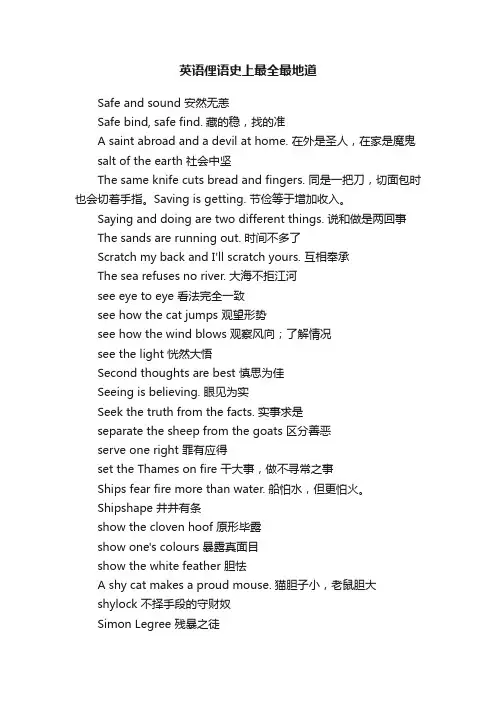
英语俚语史上最全最地道Safe and sound 安然无恙Safe bind, safe find. 藏的稳,找的准A saint abroad and a devil at home. 在外是圣人,在家是魔鬼salt of the earth 社会中坚The same knife cuts bread and fingers. 同是一把刀,切面包时也会切着手指。
Saving is getting. 节俭等于增加收入。
Saying and doing are two different things. 说和做是两回事The sands are running out. 时间不多了Scratch my back and I'll scratch yours. 互相奉承The sea refuses no river. 大海不拒江河see eye to eye 看法完全一致see how the cat jumps 观望形势see how the wind blows 观察风向;了解情况see the light 恍然大悟Second thoughts are best 慎思为佳Seeing is believing. 眼见为实Seek the truth from the facts. 实事求是separate the sheep from the goats 区分善恶serve one right 罪有应得set the Thames on fire 干大事,做不寻常之事Ships fear fire more than water. 船怕水,但更怕火。
Shipshape 井井有条show the cloven hoof 原形毕露show one's colours 暴露真面目show the white feather 胆怯A shy cat makes a proud mouse. 猫胆子小,老鼠胆大shylock 不择手段的守财奴Simon Legree 残暴之徒Simple diet, healthy children. 粗茶淡饭,孩子健康sink or swim 孤注一掷Sit above the salt 坐上席,受尊敬sit on the fence 骑墙,固守中立sit on a volcano 处境十分危险sit pretty 处于有利地位;过舒服日子six and falf dozen 半斤八两sixth sense 第六感官skate on thin ice 如旅薄冰The sky is not less blue because the blind does not see it. 蓝天并不因瞎子看不见而减少sleep a dog-sleep 打个盹儿sleep like a log 沉睡不醒slip of the tongue 说走了嘴Slanders by many mouths can melt a metal. 众口铄金Sleep is a thief; it steals half one's life. 睡眠是贼,他偷走了人的一半生命。
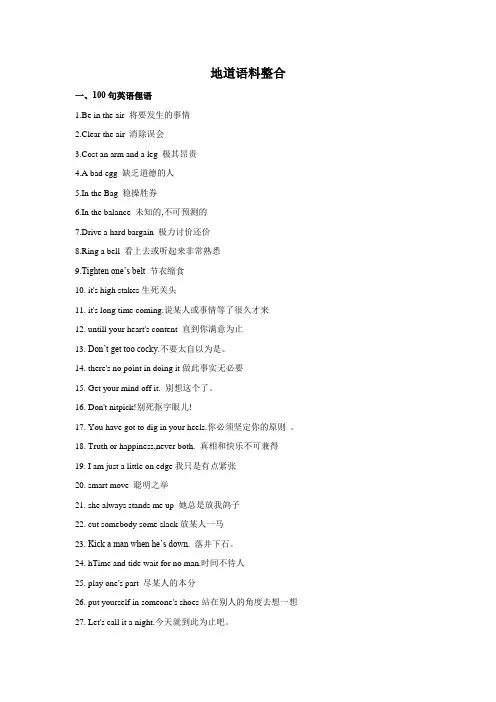
地道语料整合一、100句英语俚语1.Be in the air 将要发生的事情2.Clear the air 消除误会3.Cost an arm and a leg 极其昂贵4.A bad egg 缺乏道德的人5.In the Bag 稳操胜券6.In the balance 未知的,不可预测的7.Drive a hard bargain 极力讨价还价8.Ring a bell 看上去或听起来非常熟悉9.Tighten one’s belt 节衣缩食10. it's high stakes生死关头11. it's long time coming.说某人或事情等了很久才来12. untill your heart's content 直到你满意为止13. Don’t get too cocky.不要太自以为是。
14. there's no point in doing it做此事实无必要15. Get your mind off it. 别想这个了。
16. Don't nitpick!别死抠字眼儿!17. You have got to dig in your heels.你必须坚定你的原则。
18. Truth or happiness,never both. 真相和快乐不可兼得19. I am just a little on edge我只是有点紧张20. smart move 聪明之举21. she always stands me up 她总是放我鸽子22. cut somebody some slack放某人一马23. Kick a man when he’s down. 落井下石。
24. hTime and tide wait for no man.时间不待人25. play one's part 尽某人的本分26. put yourself in someone's shoes站在别人的角度去想一想27. Let's call it a night.今天就到此为止吧。
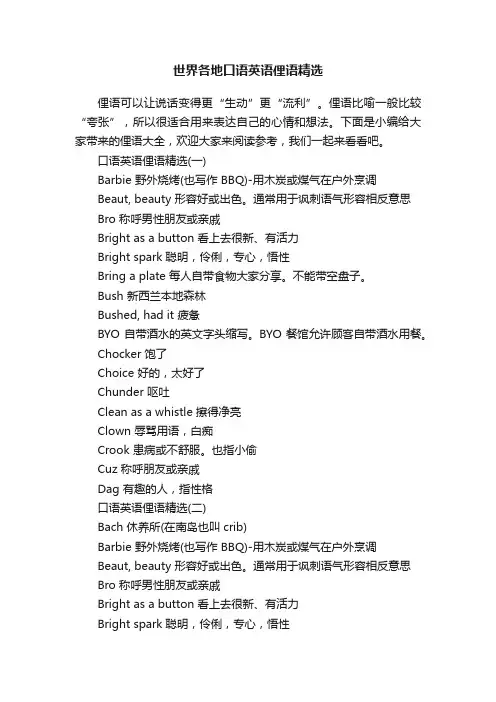
世界各地口语英语俚语精选俚语可以让说话变得更“生动”更“流利”。
俚语比喻一般比较“夸张”,所以很适合用来表达自己的心情和想法。
下面是小编给大家带来的俚语大全,欢迎大家来阅读参考,我们一起来看看吧。
口语英语俚语精选(一)Barbie 野外烧烤(也写作 BBQ)-用木炭或煤气在户外烹调Beaut, beauty 形容好或出色。
通常用于讽刺语气形容相反意思Bro 称呼男性朋友或亲戚Bright as a button 看上去很新、有活力Bright spark 聪明,伶俐,专心,悟性Bring a plate 每人自带食物大家分享。
不能带空盘子。
Bush 新西兰本地森林Bushed, had it 疲惫BYO 自带酒水的英文字头缩写。
BYO 餐馆允许顾客自带酒水用餐。
Chocker 饱了Choice 好的,太好了Chunder 呕吐Clean as a whistle 擦得净亮Clown 辱骂用语,白痴Crook 患病或不舒服。
也指小偷Cuz 称呼朋友或亲戚Dag 有趣的人,指性格口语英语俚语精选(二)Bach 休养所(在南岛也叫crib)Barbie 野外烧烤(也写作 BBQ)-用木炭或煤气在户外烹调Beaut, beauty 形容好或出色。
通常用于讽刺语气形容相反意思Bro 称呼男性朋友或亲戚Bright as a button 看上去很新、有活力Bright spark 聪明,伶俐,专心,悟性Bring a plate 每人自带食物大家分享。
不能带空盘子。
Bush 新西兰本地森林Bushed, had it 疲惫BYO 自带酒水的英文字头缩写。
BYO 餐馆允许顾客自带酒水用餐。
Chocker 饱了Choice 好的,太好了Chunder 呕吐Clean as a whistle 擦得净亮Clown 辱骂用语,白痴Crook 患病或不舒服。
也指小偷Cuz 称呼朋友或亲戚Dag 有趣的人,指性格Dork 白痴或身体动作不协调的人Dough 金钱Drive around the bend 苦恼得控制不住情绪Drongo 辱骂用语,白痴Dude 外表英俊的男子Fade 一种发型,后部头发和两鬓处很短,越接近头顶处头发越长Feed 一顿饭Flat tack 高速Foxy, fox 用于形容外表冷俊的男女Fully 我同意G’dday 问候语,相当于‘哈罗’Got the blues 用于形容悲伤的心情Greenie 环境保护主义者Gumboots 防水胶靴(英国称作高筒靴)Grog 烈性酒Grouse 好的,太好了,常用于表达喜悦Hard case 脾气倔犟,但不招人讨厌的人,行为古怪的人Hard graft 努力工作Head over heels 通常用来形容一个人极度高兴的样子Heart of gold 形容一个人非常和善Hook up 会面或加入Hoon 爱吵闹的人,粗野的人In a spin 一般指同时发生许多情况,或不知如何是好Jandals 橡胶鞋或皮带 (英国也称作 flip flops)Joker 男子Kiwi 新西兰本地鸟的符号,新西兰人Lolly 通常指蜜饯或糖果Mate 朋友,也是称呼用语Mission 冒险Mongrel 对人辱骂或表示轻蔑Mullet 一种发型,顶部头发短而直立,后部长发而披散Munted 断裂或扭曲Narley 酷,棒Nerd 乏味的人Nifty 好(适用于描述事物)No worries 同意的习惯用语On to it 能干的聪明的On a high 成功的欢乐感Once in a blue moon 罕见的,极少,几乎不Paddock 场地,运动场Paint the town red 外出散心Piker 不愿参加集体活动的人Pootang 粗俗或令人讨厌Pop on over/ pop in 到我家来玩Potluck dinner 每人带来预制的食品与全体客人分享Pressie 礼物(礼品)Pub 酒吧Rapt 非常高兴的Rellie 亲戚Rough ride 困难的经历She’ll be right 万事如意Shocking 非常糟糕的Shout 请朋友,例如吃饭或喝酒Skite 自夸,自夸者或卖弄Smoko 休息(喝咖啡或茶歇)Snowed under 一般指负责的工作太多太杂Spuds 土豆Sticks 远近郊区,乡下Stinge/Stingy 花钱不要大手大脚Stoked 非常激动Sweet as 太棒了Swot 努力学习,特别是在考试之前Ta 谢谢Tinnie 一听啤酒Tinny 幸运To take for a ride 欺骗或捉弄人Togs 泳装Tucker 食物Turn to custard 想法、计划、方案失败了Unc/Unco 干活不利索的人,经常用来侮辱或嘲弄人Under the weather 气色不好,不舒服,疲劳Uni 大学Varsity 大学Veggies 蔬菜Wicked 好的,太好了口语英语俚语精选(三)Hi mate, how ya doing?Mate只是用来称呼别人,所以这相当于How are you~G'day=helloG'day, mate!相当于What's up, man!Good on ya =Good onya=well doneTa表示谢谢的意思No worries表示没关系,澳洲人常用这个,也就说当别人和你说Ta,你可以回他“No worries”Brekki =Breakfast 早餐Chokki =Chocolate巧克力Veggie=Vegetables 蔬菜Chrissie=Christmas 圣诞节Bikkie=cookies 饼干Bog in 意思是开饭口语英语俚语精选(四)Bonzer :很好Ripper=GreatReckon=think,I reckon就是我认为Buckley's chance :不可能Mad as a cut snake:抓狂Give it a burl:试一下Bloody oath! :没错!Ay=pardon,再说一遍掌握这些基本词汇,在澳洲的时。
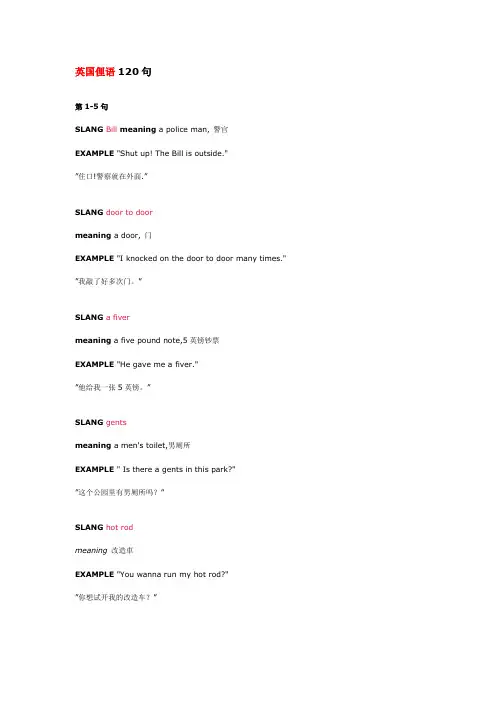
英国俚语120句第1-5句SLANG Bill meaning a police man, 警官EXAMPLE "Shut up! The Bill is outside."”住口!警察就在外面.”SLANG door to doormeaning a door, 门EXAMPLE "I knocked on the door to door many times." ”我敲了好多次门。
”SLANG a fivermeaning a five pound note,5英镑钞票EXAMPLE "He gave me a fiver."”他给我一张5英镑。
”SLANG gentsmeaning a men's toilet,男厕所EXAMPLE " Is there a gents in this park?"”这个公园里有男厕所吗?”SLANG hot rodmeaning改造車EXAMPLE "You wanna run my hot rod?"”你想试开我的改造车?”第6-10句俚语6 Irish意思a wig, 假发EXA MPLE ”He might wear an Irish.他有可能戴假发俚语7 lav意思a lavoratory, 厕所EXAMPLE "Where is your lav?"你的厕所在哪?俚语8 peeve意思to irritate,是急躁。
EXAMPLE "Don't peeve me!"别烦我俚语9 puke意味vomit,呕吐物EXAMPLE "There's puke on the table." 桌子上有呕吐物俚语10 short fuse意思a quick temper,其性子,没耐心EXAMPLE "My dad is a short fuse."我爹是个急性子俚语junk mail意思an unwanted postal advertisement, 广告邮件EXAMPLE "I have never opened the junk mail."我从来不开广告邮件俚语ding-dong意思a song, 歌EXAMPLE "My favorite ding-dong is "Yesterday"."我最喜欢的歌是Yesterday".俚语cherry ace意思a face,脸EXAMPLE "His cherry ace reminds me John."他的脸使我想起了约翰俚语shrimp意思a very small person,(蔑称)小子,不重要的人物EXAMPLE "Who is that shrimp standing in front of the door."门前站着的那小子是谁?俚语lose a bundle意思to lose a lot of money,失去一大笔钱EXAMPLE "I know, I would lose a bundle if I played the Pachinco." 我知道玩Pachinco(赌博机)会失去一大笔钱。
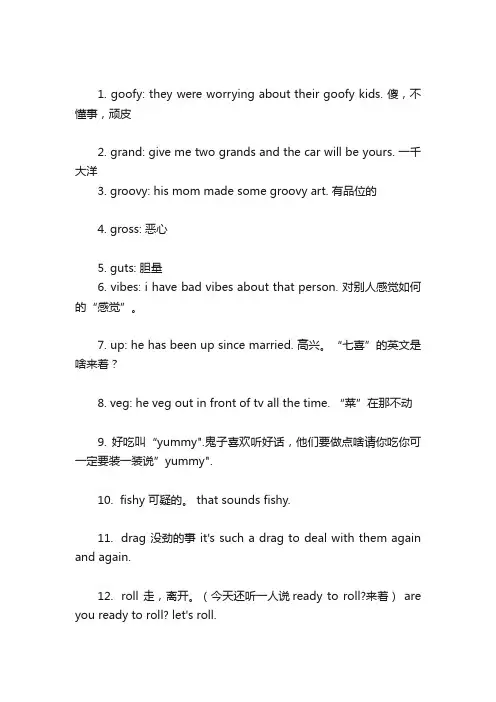
1. goofy: they were worrying about their goofy kids. 傻,不懂事,顽皮2. grand: give me two grands and the car will be yours. 一千大洋3. groovy: his mom made some groovy art. 有品位的4. gross: 恶心5. guts: 胆量6. vibes: i have bad vibes about that person. 对别人感觉如何的“感觉”。
7. up: he has been up since married. 高兴。
“七喜”的英文是啥来着?8. veg: he veg out in front of tv all the time. “菜”在那不动9. 好吃叫“yummy".鬼子喜欢听好话,他们要做点啥请你吃你可一定要装一装说”yummy".10. fishy 可疑的。
that sounds fishy.11. drag 没劲的事 it's such a drag to deal with them again and again.12. roll 走,离开。
(今天还听一人说ready to roll?来着) are you ready to roll? let's roll.13. nuts 疯 are you nuts? the trafic drives me nuts.14. freak out 紧张害怕 don't freak out if cops pull you over.15. rip off 骗了(钱了) i realized i was ripped off after payed $200 for these shoes.16. bug 讨厌 stop bugging me with your plan. i won't do it with you17 shrink =a psychotherapist 心理医生18 airhead =a silly. rather unintelligent person. his girlfriend is an airhead.19 a-yo 比较随便的打招呼,近似于"what' up?" "hey!"20 buzz 打电话 give me a buzz when you reach home.31 bread =money. breadwinner 养家的人32 booty 屁股 check out her booty!33 boob 乳房34 cheesey 很没品味,很土corny the gift i receieved from ryan is cheesey.35 cig cigarette的缩写 you got a cig?36 crap =nonsense what he said is crap. don't believe a word of it.37 f-u-c-ked up 可以表达很多意思,比如“糟透了,笨死了” you are pretty f-u-c-ked up.38 freaky =weird he's a freaky guy.=he is a freak.39 flick =movie that was a good flick.40 get on (one's) nerves =to annoy you really get on my nerves.41 goof 笨蛋 goofy=silly42 hang out (和朋友)出去消遣43 hooker 妓女44 hot 迷人 man. that girl was hot! she is such a hottie!45 juicy 桃色八卦的 a juicy scandal46 jerk 粗蠢之人47 jerk off =to masturbate48 jackass “公驴”,说人就是“蠢驴”的意思, mtv台就有一档叫jackass的节目,专门表演一些无聊又愚蠢的玩意儿逗乐49 pimp 拉皮条的50 puke =vomit there's puke on the floor.51 pussy =vagina52 redneck (美国的)乡巴佬53 sassy =styling. 时髦的 those clothes are sassy!54 nifty 棒,一流的 here's a list of all-around nifty things that we've found over the years.55 screw up =err;mess up they screwed up that paint job. なwww.56 suck 讨厌,烦人final exams suck.57 twisted = displeasing; messed up that's twisted! twisted mind 奇思异想;怪脑筋58 meth methamphetamine的缩写,即“冰毒”59 tweaker =a person who uses meth60 mdma 摇头丸,也叫“ecstasy”61 pot =marijuana;joint 大麻烟62 crack 强效可卡因63 whiz 小便 i just took a whiz.64 gig =job i just do these gigs as a cover.65 dump 甩了某人(比如女朋友)66 get high 爽一下do you get high?67 p-i-s-s off68 get a crush on somebody 迷上某人69 thirtyish = thirty something 三十多岁的 70 bent =angryit's ok. don't get so bent. powered by , all rights reserved.71 booze = alcoholhe promised to bring two bottles of booze to the party.72 call =predictionthe weatherman made a good call about when the storm would come.73 chintzy =cheapthat really was a chintzy present you got him.74 cut out =leaveit is late. i have to cut out.75 dope -drugthere are a lot of dope dealers around here.76 freebie 免费品the pillow was a freebie77 get it =understandi listened to the joke twice. but i still don't get it.78 grubby = unclean and untidythose clothes are too grubby to wear to the party.79 hairy =dangerousthat was a hairy plane trip. i am glad the storm is over.80 fag 是"faggot"的简写,对同性恋男子的贬称81 street smart 知道在城市生活该怎么处置一些事情,应该如何应付各种不同的情况,比如如何保护自己。
英语俚语俗语大全俚语是语言中最鲜活最独具特色的组成部分,英文的俚语就像中文的方言一样,是语言这个大花园中陪衬主要栽培物的野花,但是正因为这些野花,这个大花园才更加生机盎然,更加朝气蓬勃。
下面是小编整理的英语俚语俗语,欢迎大家来阅读。
英语俚语俗语大全A bird in hand is worth two in the bush.一鸟在手胜似二鸟在林.A Blessing in Disguise?因祸得福?A fall into the pit, a gain in your wit.吃一堑, 长一智.A good anvil does not fear the hammer.真金不怕火炼,好汉不怕考验.A good artist should have his head in the clouds sometimes, but his feet always on the ground.一位好的艺术家有时应富于幻想, 但始终要脚踏实地.A man of great wisdom often appears slow.大智若愚A mind bent on returning is like an arrow.归心似箭A plague of pustulant boils upon all their scurvied asses.愿他们的屁股生疮发烂。
A rolling stone gathers no moss.[谚]转石不生苔;[喻]转业不聚财.A watched pot never boils.心急喝不了热粥.A word to the wise is sufficient.有灵犀者一点就通.After suffering comes happiness.苦尽甘来Agues come on horseback , but go away on foot.病来如山倒,病去如抽丝.All that is now just water under the bridge.一切都付之东流An eye for an eye.以牙还牙.Any statement against the government is like a red rag to a bull to that minister.任何反对政府的言论都会惹得那位部长暴跳如雷.As the saying goes, It is no use crying over spilt milk.俗话说: “覆水难收. ”Beard the lion in his den.太岁头上动土.Birds of a feather flock together.[谚]物以类聚.Blood is thicker than water, and Bill was part of the dynasty.血浓于水, 而比尔究竟是福特王朝的一个成员.By then, all the witnesses were six feet under.到那时, 所有的证人都埋在了黄土之下.By this means she cast in a bone between the wife and husband.她用这种手段离间这对夫妻.come hell or high water就算天崩地裂;无论如何Constant dripping wears away the stone.滴水穿石;铁杵磨成针.Distant hills are greener.这山望着那山高。
英文俚语大全英文俚语使得语言更加丰富多彩。
下面店铺为大家整理了英文俚语大全,感兴趣的,过来看看吧。
英文俚语摘抄blue clollar 蓝领white clollar 白领pink clollar gold 粉领族(指和蓝领体力工人相当的女性工人)gold-clollar workers 金领族(一般都有一技之长,对公司工作的方方面面都十分了解,甚至对公司的利润大小和收益都有直接的重要影响。
他们的工作环境优雅,职业体面,有着丰厚的收入和稳固的经济地位)dog-eared books 读得卷了边的书dog sleep 不时惊醒的睡眠dog tired 像狗一样的累dog watch 夜班old dog 上了岁数的人、老手a sly dog 偷鸡摸狗者a yellow dog 杂种狗、卑鄙可耻的小人a big dog 看门狗、保镖;要人you are a lucky dog! 你真是个幸运儿!dog nose 啤酒与杜松子酒的混合酒a dog in a blanket 葡萄卷饼或卷布丁as faithful as a dog 像狗一般的忠诚,在西方文化中,狗是忠实、卖力、辛劳的化身。
He, who lies down with dogs must rise up with flea近朱者赤,近墨者黑a good dog devers a good bone .西方人论功行赏时常说好狗应有好骨头 aa dog in the manger 占着马槽(不拉屎)Honey,i forgot to duck 亲爱的,我忘记闪开了。
eat crow 由于夸大其词或过分自信,最后不得不承认错误。
eat his words 食言out at elbows elbow one's way 捉襟见肘elbow one's way 用胳膊肘挤来挤去为自己开道get a black eye 被别人打青了眼睛mind your eye 叫别人当心blink our eyes 眨眼睛flash our eyes at sth 瞟一眼make eyes cast sheep's eye 抛媚眼cast sheep's eye 暗送秋波You have an eye for sth有眼光有见解finely arched eyebrows 纤细的弓形眉pencil the eyebrows 描眉rough bushy eyebrows 浓密的粗眉eyelash grower 睫毛膏eyelash curler 卷睫毛器without turning an eyelash 泰然自若,不动声色not bat an eyelid 没合眼睡觉 ,对事情泰然自若hang on by the eyelids 事情危在旦夕英文俚语推荐drink like a fish 牛饮flats 平跟鞋footfall 客流量green eyed 嫉妒green finger(thumb)? 把大伙干不好的活都干得漂漂亮亮例如:A person with green finger has a magic touch that makes plants grow well and quickly.长着绿手指的人是有魔法的,只要他一碰,植物就长的又快又好。
英语的俚语大全以及解释俚语,拼音是lǐyǔ,是指民间非正式、较口语的语句,是百姓在日常生活中总结出来的通俗易懂顺口的具有地方色彩的词语。
下面是小编给大家带来的俚语大全,欢迎大家阅读参考,我们一起来看看吧!英语的俚语大全以及解释1、save for a rainy day你是不是“月光族”?不管每个月拿多少钱,到了月底肯定是花光光。
看来,你还没有考虑过rainy day。
rainy day是下雨天的意思,但很早以前,它就有了“困难、不幸”之意,所有save for a rainy day也就是“以备不时之需”的意思。
月光族们要好好自我反省一下哦,不能今朝有酒今朝醉啦。
Ads from the bank keep advising people to save some money for a rainy day.银行的广告一直建议人们存钱以备不时之需。
2.when pig fly很多形象的说法来比喻某事不可能实现,比如:白日做梦、太阳从西边出来、异想天开……而英语中也有一个形象搞笑的说法,就三个词:“when pig fly”(当猪可以飞的时候)。
猪,又肥又胖,没有翅膀,靠自己的力气是飞不起来的。
所以当猪可以飞的时候,那可真是鼠年马月了。
这种说法源自苏格兰,还曾经在《爱丽丝梦游仙境》中出现。
——Do u think ur brother will be successful?你觉得你弟弟会吗?——When pig fly he will鼠年马月吧。
3.guest star 客串Courteney Cox and Jennifer Aniston will smooch on the season finale of "Dirt". In the episode, Aniston guest star as a lesbian magazine editor and rival to Cox’s character.安妮斯顿将和好友考克斯在《丑闻》大结局时上演吻别镜头。
地道英语句典A-Z #281-290 地道美语实用句子中英对照总汇,把整体美语环境带到你面前唯一途径。 (某些措辞可能不雅或冒犯,请读者原谅和自行选择)
*他说: “(我对这方面的看法)1是假如你(穿着吻合你的角色)2来(投射)3那(专业人士)4的(精细)5和(详尽)6(形象)7, (跟你有来往的人)8(会赏识的)9.”: He said: “(The way I look at it)1 is (people dealing with you)8 (will appreciate it)9 if you (dress your part)2 in projecting3 that meticulous5 and scrupulous6 image7 of a professional4.”
川: (~) waterway; (平~) flatland; (~) abbreviation for Sichuan province; (盘~) expense allowance *她说: “在上海我(耗尽/ditto)1 (携带)2给这个(旅程)3的(盘川)4, 但(仍然)5(我不能够找到工作)6.”: She said: “In Shanghai I (exhausted/used up)1 the (spending money)4 I (took along)2 for the trip3, but still5 (I wasn‟t able to find a job)6.”
chuán: 船: (~) watercraft 帆船: sailboat 轮船: steamboat 渔船: fishing boat 汽船: motorboat 船坞: dock 船首: bow 船尾: stern 水翼船: hydrofoil craft 气垫船: hovercraft 救生船: lifeboat 造船厂: shipyard 拖网渔船: trawler 远洋轮船: ocean liner 宇宙飞船: spacecraft (小船儿/小划子[艇仔]): (small boat/sampan)
*他问道: “(下一班渡轮船)1几时 (离开)2?”: He asked: “What‟s the (departure)2 time for the (next ferry)1?”
*她说: “这个(圣诞节)1我将会(参加)2一个去南太平洋(游船河)3.”: She said: “I‟m going to take2 a South Pacific cruise3 this Christmas1.”
*他问道: “从广州来的轮船({什么时间}1a/{几点钟/ditto}1b) ({靠岸}2a/{抵达/ditto}2b): He asked: “({When}1a/{What time}1b) is the boat from Guangzhou ({going to dock}2a/ {going to arrive/arriving}2b)?” *一艘(水警)1(巡洋舰)2(进行)3 (一个搜索)4(发现/ditto)5十个(偷渡者)6在一艘(摇晃/ditto)7的(货轮)8(船上)9: A coast-guard1 cruiser2 conducted3 (a search)4 that (turned up/found/ discovered)5 ten stowaways6 (onboard/aboard)9 a (rickety/ wobbly)7 freighter8.
*她问道: “你的弟弟还跟同一个女孩子(约会)1吗?” 她的朋友说: “不是, 他(脚踏多只船/跟好几个女孩子约会/ditto)2.”: She asked: “Is your brother still (going out)1 with the same girl?” Her friend said: “No, he (has been playing the field/has his fingers
in many pies/has been dating many different girls)2.”
*去年我们公司的(全年最佳员工)1({收到}2a/{被奖赏}2b)(加勒比海游轮)3两张(头等舱船票)4: Last year the (Employee of the Year)1 of our company ({received}2a/{was awarded}2b) two (first-class cabin tickets)4 on a (Caribbean cruise)3.
*几个从(沉船)1的(船难逃生者)2被(放逐)3到一个(荒芜岛屿)4(好几天)5他们才(被拯救)6: Several castaways2 from the shipwreck1 marooned3 on a (deserted island)4 (for days)5 before they were rescued6.
*他说: “我({不是免于晕船/ditto}1a/{很容易晕船}1b), 一个(在海上旅行)2的(长途航程)3对我来说是(折磨多于乐趣)4.”: He
said: “I ({don‟t have sea legs/am not immune to seasick}1a/{get seasick easily}1b) and a cruise2 voyage3 is (more torture than
pleasure)4 to me.”
*那(售票出纳员)1说: “那去中心岛屿的(四十分钟)2({渡轮乘坐}3a/{轮船乘坐}3b)(每小时)4从那边的(码头/ditto)5(出发)6.”: The ticket-cashier1 said: “The forty-minute2 ({boat ride}3a/{ferry ride}3b) to Center Island departs6 from the (pier/wharf/dock)5 over there (every hour)4.”
传[傳]: (~递) transmit; (~播) spread; (~讯) to summon; (~情) express (feelings); (~真) fax; (~说) legend *他(计划)1(当他退休时)2把(家族生意)3(传给)4(儿子)5: He (plans to)1 (pass on)4 the (family business)3 to his son5 (when he retires)2.
*在(除夕)1的(大家庭团年晚饭)2是(世袭遗留)3的(传统)4: A (big family reunion dinner)2 on (Chinese New Year‟s Eve)1 is a time-honored3 tradition4.
*({习俗上}1a/{传统上}1b)中国人用(筷子)2而不是(餐具)3来吃: ({Customarily}1a/ {Traditionally}1b) Chinese eat with chopsticks2 and not cutlery3.
*(多元族裔体制)1是像(母亲)2和(苹果馅饼)3一样是美国的(传统)4(一部分)5: Multiculturalism1 is as (part of)5 America‟s tradition4 as mom2 and (apple pie)3.
*吃(动物脑子)1(使你更聪明)2只是(没有可信科学证据支持)3的(民间传说)4: Eating (animal brain)1 (makes you smarter)2 is only an (old wives‟ tale)4 (not supported by credible scientific evidence)3.
*我们(找办法)1去令我们的({信息传递}2a/{资产的使用}2b) (达到最佳的效果)3: We (find ways)1 to optimize3 our ({information flow}2a/{asset utilization}2b). *(流传)1那(曾是)2(世界上最大的汽车制造商)3将会({走进}4a/{宣布}4b)(破产)5: (The word on the street)1 is the once2 (largest automaker in the world)3 would ({go into}4a/ {declare}4b) bankruptcy5.
*两个学生被(突然发觉)1在(一个期末考试)2(互相)3(传小抄[傳貓紙])4后被(驱逐出中学)5: Two students were (expelled from high school)5 after they were caught1 (passing crib notes)4 (to each other)3 in (a final exam)2.
*(微笑)1是(有传染性/ditto)2, 如果我们(经常微笑)3我们一定(有更美好的世界)4去(生活)5: Smiling1 is (infectious/ contagious)2, and we‟ll (have a better world)4 to (live in)5 if we (smile often)3.
*(高级时装)1(衣服)2是(逐一)3 ({用手缝制}4a/{用手制造}4b)而不是经过(传送带式)5的(生产)6: High-fashion1 clothing2 is individually3 ({hand-sewn}4a/ {hand-made}4b) and not through the (conveyor-belt type)5 of production6.
*他(以自身的资格)1使他有成为({模范市民}2a/{星级人物}2b/{天才}2c/{传奇人物}2d): : He‟s a ({model
citizen}2a/{star}2b/{talent}2c/{legend}2d) (in his own right)1.
*这个(股票权威的)1(所谓)2(内幕秘密消息)3(不可以尽信)4因为它们(来自)5(传闻)6而不是(可靠源头)7: This (stock guru‟s)1 so-called2 (insider stock tips)3 (should be taken with a grain of salt)4 because they (come from)5 hearsay6 [note: not “hearsays”] and not (reliable sources)7.